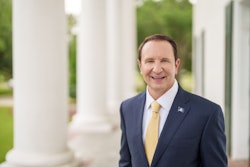North Carolina community college students are caught in the cross hairs of illegal immigration opponents.
North Carolina’s 58 community colleges have been key players in the state’s fast-shifting economy, driven in large part by the numerous businesses flocking to the high-technology Raleigh- Durham Research Triangle area.Major employers like IBM, Novartis, Credit Suisse and EA Associates have all partnered with North Carolina Community College System institutions to keep employees trained on the latest in high technology. In fact, a recent North Carolina Center for Public Policy Research study calls on the state to ramp up its investment in community colleges, declaring that two-year institutions are best equipped to deal with critical shortages in the number of nurses, teachers and biotechnology workers needed to sustain the state’s economic growth. Nevertheless, recent actions by the North Carolina State Board of Community Colleges threaten to deny the growing population of undocumented state residents any opportunity to get a community college education.
In response to a request from the state attorney general to clarify federal policy on the undocumented student issue, the Department of Homeland Security in July informed the state that federal law does not bar the admission of undocumented students by public colleges. Subsequently, numerous advocacy groups, editorial boards and the North Carolina Association of Community College presidents all asked the board to lift the ban on undocumented student enrollment enacted in May, in light of the federal government’s finding.
Nevertheless, in August, the board voted to approve a motion by Lt. Gov. Beverly Perdue to continue the undocumented student ban while a study of the issue commissioned by the board is being conducted.
Perdue, who sits on the board in an ex-officio capacity, is the Democratic nominee for governor, and both she and her Republican opponent, Charlotte Mayor Pat Mc- Crory, are united in their desire to implement a permanent ban on the admission of undocumented students to any public college, in line with growing anti-illegal immigration fervor in the state.
Tony Asion, executive director of the Raleigh-based Hispanic advocacy group El Pueblo, says he is surprised both gubernatorial candidates have turned their backs on undocumented students, even those brought to the state as small children who eventually graduated from public North Carolina high schools.
“What is really sad here is that both gubernatorial candidates are saying the same thing. We kind of expect this from the right, but we certainly didn’t expect this from the left,” Asion says. At the same time, left-leaning Democrats once sympathetic to the plight of undocumented students “are trying to court the Latino vote here,” Asion says. But “you know what? It doesn’t feel any better getting beaten up by your friends than it does getting beaten up by your enemies.”
Playing Political Football
A number of community college presidents statewide say their institutions should not be involved in illegal immigration politics.
“As an educator, it’s difficult to deal with the politics because we’re in the business of teaching students. Community colleges are not the immigration police. That’s not what we signed on to do,” says Wake Technical Community College President Stephen C. Scott, who is also the president of the North Carolina Association of Community College Presidents.
Scott adds, “All community college educators are in this business because we want to help adults learn and improve their lives.
One of the things that bothers me, if the INS [now Immigration Customs Enforcement] is not able to control the problem, how in the world do you expect a bunch of underpaid teachers in the community college system to solve the immigration issue?”
Asheville-Buncombe Technical Community College President Betty Young expresses similar sentiments.
“The issue of immigration is not an issue to be addressed in the admissions offices of community colleges across this country,” Young says. “Immigration is a national issue; we need national policy and leadership to determine what is in the best interests for our country, and then we need to carry out that policy, and we have failed to do that,” she adds.
Nevertheless, Perdue’s chief of staff, Don Hobart, says the lieutenant governor feels strongly that state residents who cannot work legally should not be allowed to enroll in public colleges.
“While education is one of the worthiest goals of state and local governments, it is hard to justify the expenditure of state funds to train workers who cannot reasonably expect to remain in the country, let alone the state,”Hobart says.
Dollars and Sense
However, Scott and numerous other educators say the perception that the state actually loses money on the education of undocumented community college students is false. In fact, because out-of-state North Carolina community college tuition rates of about $7,400 a year are among the highest in the nation, “the state would actually make about $2,000 per illegal or undocumented student,” Scott says. Also, these extra tuition dollars go straight into state coffers, unlike the practice of other states that allows their community colleges to retain some tuition funds, Scott adds.
While it does cost the state money for undocumented students to attend K-12 public schools, when “they arrive at the community college door, they pay out-of-state tuition, which more than covers the cost of their education,” Young says.
“But those who oppose immigration have put the message out that these people are in school receiving a free education. They do not qualify for federal financial aid, and they’re paying out-of-state tuition. So it’s not a free ride,”Young adds.
Also, some community college educators note that the heated rhetoric denouncing undocumented student admission belies the fact that, according to the community college system, just 112 degree-seeking undocumented students were enrolled in system schools during the 2006-07 academic year— less than one-half of 1 percent of nearly 300,000 students in that category.
Illegal immigration hand-wringing in North Carolina has led the community college board to make no fewer than four changes in undocumented student policy in the last eight years, frustrating many educators and education advocates. “Four years ago, we were battling for our kids to get in-state tuition; now we’re battling just to get them into school,” Asion says. “We’re actually going backwards instead of forward. And we feel that this is a sad day in America.”
Scott expresses exasperation with the fact the community college system has “flipflopped” on undocumented student policy “somany times in the last two or three years. Frankly, I want a decision.Whatever that decision would be,we willmove forward.” However, absent comprehensive immigration reform at the federal level, Hobart says the state on its own cannot properly address the illegal immigration issue.
“I recognize this is a hard issue for some, but it arises squarely from the total failure of our Washington leadership to develop a meaningful federal immigration policy for the country,”Hobart says.
“This is a federal issue, and individual states are not equipped to deal fairly or capably with the problem—a fact borne out by the inconsistencies that are inherent in any effort to distinguish between those illegal immigrants that a state decides it will educate and those it decides it will not,”Hobart adds.
Costs and Consequences
However, educators and social scientists warn of the dire social consequences that will inevitably be the result of hopelessness and frustration borne by a generation of Hispanics denied access to community colleges, despite the fact many of them have lived in the United States since they were small children. Central Piedmont Community College President Tony Zeiss says he hopes the board will go back to a policy that allowed individual colleges to make admission decisions on undocumented students, and he wonders if state policymakers really want to deal with the negative social outcomes of denying some residents the opportunity to learn skills, obtain a job and raise their families.
Young says the evidence is clear that North Carolina is courting disaster by denying all undocumented residents, irrespective of individual circumstance, access to community colleges.
“If we just look generally at what happens to other populations that are uneducated or undereducated, there’s a higher propensity” to engage in adverse health behavior like smoking and drinking,Young says.
“There are adverse consequences in terms of crime, and this is across-the-board in terms of the social consequences of not having an education, and that leads to the likely social consequences of living in poverty. So we have to expect that,” Young adds.
Asion says it’s clear that a community benefits from promoting higher education among all residents, including those without legal resident status. For instance, Asion says that when undocumented Mexican immigrants settled in cities like Chicago and Los Angeles and were shunned and maligned by governmental and other institutions, they found refuge in violent street gangs,Asion says.
However, when a community encourages educational attainment of all its citizens, prosperity follows, Asion says. “So you can see what the fruit of your labor is, either way. If you allow people to be educated, if you welcome change, if you allow it to happen, you’ll benefit from it. If you deny it, it will cost you,” Asion says. “Denying it isn’t going tomake it go away.”
End Game
Ultimately, Zeiss says he is optimistic the community college system will implement a policy allowing undocumented students to enroll, much like the policy already implemented by the state’s four-year college system, which is currently considering expanding access for its undocumented immigrant students.
“I trust the state board; I believe that they will study” the undocumented student issue thoroughly, Zeiss says. “The fact that the universities are still allowing undocumented students in and [they are] paying out-of-state tuition, I think that will carry a lot of weight.”
However, like people on all sides of the undocumented student issue in North Carolina, Zeiss says the “real problem lies with Congress. Congress ignores it. Congress should be decisive. And as long as they’re not decisive, then we have these issues not only at the state level, but in every community, and they become divisive.”
‘A Politically ChargedWedge Issue’
North Carolina’s decision to ban access to community college degree programs for undocumented students is demographically and economically a mistake, says a local demographer.
The North Carolina State Board of Community Colleges decided this summer to enforce a ban on access to credit programs for undocumented students while a study concerning the matter is undertaken. Diverse recently spoke with Dr. James H. Johnson, the William R. Kenan Jr. Distinguished Professor of Entrepreneurship at the University of North Carolina at Chapel Hill, about a report he co-authored, “The Economic Impact of the Hispanic Population on the State of North Carolina (2006).” The report determined that North Carolina’s Hispanic population, 45 percent of which was estimated to be undocumented, works in every sector of the market and contributes more than $9 billion to the state’s economy through purchases and taxes,while costing the state $61 million in educational and other expenses. Additional report details can be found at the following site: http://www.kenan-flagler.unc.edu/KI/reports/2006_HispanicStudy/.
DI: When you first heard about the community college board decision regarding access for this population, what were your thoughts?
JJ: That we should be investing in the talent pool that we have at our disposal, in part, because of the increasing number of retirementeligible folks that will be exiting the labor market in North Carolina. For me as a demographer, this issue of preparedness is crucial to our competitiveness.We need to step up and invest in this group, especially considering that it is a relatively small group of students who fit these criteria.Demographically and economically it is amistake not to provide this access.
DI:Why do you think there is somuch emphasis being placed on this particular issue in North Carolina?
JJ: There is a series of myths about the costs and benefits of this population. There is the belief that they are a burden and that they take more than they contribute to our economy. Problem is, there is no empirical evidence to support that. Plus, it’s a politically charged wedge issue, in an election year.
DI: How has the Hispanic economic impact report been received by the general public?
JJ: There have been over 250,000 downloads of the report.We have given 150 lectures on this report since its publication. Every once in a while, there’s an irate person in the audience, but not too often. Inmost of the places we’ve been and shared the report data, there has usually been an“aha”moment formost people.Maybe they hadn’t thought about this issue in the empirical way we present it.
DI: Froman economic perspective, what is the impact of this decision on North Carolina’s work force development needs?
JJ: Because we have an aging population of workers combined with a smaller pool of workers coming behind them, the issue becomes, where are we going to get the talent? So we’re left with one of two choices: we can either import the talent we’re going to need or we’ll need to grow and nurture it locally. I think this particular issue lends itself to growing and nurturing this available group of workers.
DI: If you were a betting man, how likely do you imagine it is that the federal government will address this issue in a way thatmakes it clear which direction states should follow?
JJ: I am not a betting man, and if I were, I sure wouldn’t bet on this one! Maybe after the election there will be some sense of order forthcoming, but right now it’s a crap shoot. I think both presidential candidates are supporters of comprehensive immigration reform in some way.Maybe after the election they will be able tomove forward on this.
— By Pamela G. Senegal
Click here to post and read comments
© Copyright 2005 by DiverseEducation.com


















